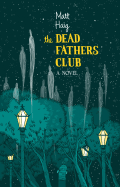
 Eleven-year-old Philip Noble's father was killed in an automobile accident, and as the novel opens, the boy is quite startled to see his dad appear as a blood-stained ghost at his own funeral. Philip is the only one who can see or hear him and discovers that his dad has become a member of The Dead Fathers Club, which consists of fathers who have been murdered. Dads Ghost explains that his brother, Uncle Alan, cut the brake lines in his car because the uncle wants both Philip's mother and the family pub, the Castle and Falcon. He further explains that the only people who end up as ghosts are murdered; all ghosts get the Terrors; the Terrors stop only when ghosts stop being ghosts, and that happens only when the murderer is killed. If his death is not avenged, he will spend eternity in the Terrors. The catch: the revenge has to take place in No Time, which in Dads Ghosts case is 11 weeks. This is a tall order for a young lad who's not particularly adept at sports.
Eleven-year-old Philip Noble's father was killed in an automobile accident, and as the novel opens, the boy is quite startled to see his dad appear as a blood-stained ghost at his own funeral. Philip is the only one who can see or hear him and discovers that his dad has become a member of The Dead Fathers Club, which consists of fathers who have been murdered. Dads Ghost explains that his brother, Uncle Alan, cut the brake lines in his car because the uncle wants both Philip's mother and the family pub, the Castle and Falcon. He further explains that the only people who end up as ghosts are murdered; all ghosts get the Terrors; the Terrors stop only when ghosts stop being ghosts, and that happens only when the murderer is killed. If his death is not avenged, he will spend eternity in the Terrors. The catch: the revenge has to take place in No Time, which in Dads Ghosts case is 11 weeks. This is a tall order for a young lad who's not particularly adept at sports.Philip is a slightly nerdy boy, not too popular at school, with a grand imagination. He loves history, particularly Roman history, and often imagines Roman scenes. During a field trip to Hadrian's Wall, "[He wonders if] Emperor Hadrian was murdered and if he ever comes back to see what is left of the wall and if he gets sad when he sees just lumps of stone in the ground with grass growing over them and a few people walking with maps and looking at them and wanting to go home." He isn't afraid of his father's spectre but is worried about his ability to follow his father's directions and kill his uncle. He's game, though, and when Dads Ghost persuades Philip to steal the keys to a teacher's minivan to hurry home to warn his mum that trouble was coming to the pub, Dads Ghost tells him how to shift and steer, but he gets caught before he can get far. Dads Ghost then guides Philip in helping his mum when the pub does get smashed up, and later leads him through a rugby game at school. In the meantime, Uncle Alan makes inroads--he brings karaoke to the pub and convinces Philip's mother to marry him. The pressure on Philip increases as time begins to run out, but all his plans to kill Uncle Alan seem hopeless until he gets a few ideas in chemistry class.
Matt Haig's prose is quirky, with no apostrophes, liberal use of capital letters, and some creative typesetting. He captures Philip's young voice with its innocence and acceptance of a new reality. When Philip asks his father if there are any Romans in The Dead Fathers Club,
"Dads Ghost said Romans?
I nodded my head and said Roman soldiers?
He said No but theres a Victorian.
I said Oh."
Haig has a deft descriptive touch. A church "smelt of God which is the smell of old paper." When Philip reluctantly answers Uncle Alan, "In an invisible ice cube out of my mouth I said Yes."
Philip negotiates a way between anger and pain, bewildered by his mother's capitulation to Uncle Alan, while being visited by an increasingly insistent ghost. He experiences his first romance and deals with well-meaning teachers, along with school bullies, a bit of shoplifting, a suicide attempt and tranquilizers. Jacket copy alert: The Dead Fathers Club can be described with many superlatives, but it's not "incredibly funny." It is, however, a poignant, original, often charming story of a boy struggling in sorrow and misery with all his heart.--Marilyn Dahl

